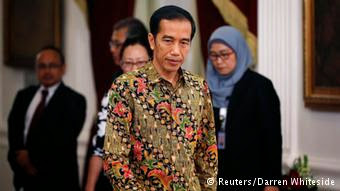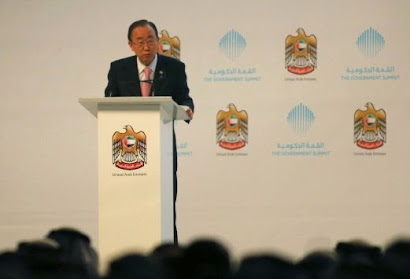
Bagus Adimas Prasetio playing at the Mall of Indonesia, above. Bagus receiving an Indonesian Museum of Records certificate from Salim Segaf Al Jufri, the minister of social affairs, center, and Jaya Suprana, the museum’s founder. (JG Photos/Sylviana Hamdani)
There was an undercurrent of excitement among the 50 or so people gathered at the main atrium of the Mall of Indonesia in North Jakarta on March 19. Jaya Suprana, chairman of the Indonesian Museum of Records (MURI), was up on the stage, heaping praise on the star of the show, whom he likened to one of the greats of classical music.
“When Frederic Chopin was making his debut in Paris, no one acknowledged him, as he was still young and unknown to the world,” Jaya said.
“It was Robert Schumann who recognized his talents and said, ‘Hats off, gentlemen. Here is a genius and pianist of the future.’ Today, please allow me, Jaya Suprana, to say to you, ‘Hats off, gentlemen. Here is an Indonesian genius and jazz pianist of the future.’ ”
Breaking into loud applause, the audience welcomed Bagus Adimas Prasetio. The pianist, seemingly oblivious to everyone and everything else, bowed his head over the piano keys and smiled thinly before proceeding to play. His fingers lightly tapped out “Fragment,” a classical piece composed by Jaya, who is also a composer and pianist.
The sweet and soft haunting melody of “Fragment” suddenly progressed into an elaborate upbeat tempo. As beads of perspiration started to dot Bagus’s forehead, he continued to play flawlessly.
“It’s a very difficult piece,” said Ivon Maria Pek Pien, Bagus’s teacher. “We trained day and night for eight days to master the composition.”
The performance was even more impressive considering that Bagus is blind and there is no Braille music sheet for “Fragment.” Ivon had to teach Bagus how to play the piece by helping him coordinate his movements.
“We worked on the right hand first and then on the left. However, when he started to play with both hands, it was a mess,” Ivon said, with a chuckle. “He banged the piano lid once because he couldn’t get it.”
Ivon’s patience and Bagus’s perseverance paid off in the end.
“Once he got it, about two days ago, he was good to go,” Ivon said.
The 22-year-old played 12 songs for the crowd at Mall of Indonesia over an hour and 15 minutes, in the process becoming the first blind Indonesian pianist to put on a solo recital.
“Bagus has been blind since birth,” his father, Bambang Haryanto, said after the recital. “The doctor said that he might have contracted German measles when he was still in the womb. It was very hard for us to accept this reality.”
Bambang and his wife did everything in their power to help Bagus succeed and excel in life. They enrolled him at a special-needs school, Sekolah Luar Biasa, in their hometown, Surabaya.
“As parents of a child with special needs, we thought, ‘How can we provide for him and his future?’ ” Bambang said.
There was no easy answer. Bambang, who works at a freight forwarding company, only earned enough for the family’s current needs and was worried about his son’s financial future.
“As a man, Bagus had to be independent and earn a living for himself,” Bambang said. “Being blind, he could either study to become a teacher, a masseur or a musician. So we encouraged him to learn music. We didn’t want him to beg for a living.”
Bagus said he was happy his parents helped steer him toward music. “I had to have something to be proud of,” he said. “Other children may be good at sports or academics, and I also needed to be good at something.”
He started taking piano lessons at his school when he was in the third grade. He started by learning classical music from Braille music sheets. He had to memorize the pieces by heart because he could not refer to the sheets once he stared playing.
But classical music, with its fixed structure, soon bored Bagus. “There was not much room for improvisation and spontaneity,” he said.
His father, a jazz aficionado, suggested that maybe jazz would be more up his alley. And study jazz Bagus did. From 2001 to 2009, he trained under Bubi Chen, a renowned jazz pianist in Surabaya, who helped Bagus discover his true passion.
“My restless and rebellious spirit finds expression in jazz,” Bagus said.
Growing up among other kids with various special needs at his school, Bagus was often frustrated by the way some of the teachers and his fellow students would limit his capabilities.
“They would say, ‘You’re demanding too much of yourself,’ ” he said. “ ‘It’s not possible,’ they’d say. But I’ve found out that there are no boundaries to what one can achieve, except for the ones that you have set yourself.”
To prove his point, Bagus enrolled at SMU GIKI 1, a regular high school in Surabaya, which he attended from 2002 to 2005. To hone his skills, Bagus also attended music clinics in Surabaya organized by the Chicago Jazz Quartet from the United States, the Ad Colen Quartet from the Netherlands and Alexey Sokolov, a professor at the St. Petersburg Conservatory.
In 2009, Bagus started to study music under Ivon, who in addition to being a music teacher is also chairwoman and an international jury member of the Ibla International Awards, a prestigious world music competition.
As Bagus developed his skills as a pianist, his self-confidence grew as well. He started taking part in jazz festivals around the country.
From 2003 to 2006, he was named Outstanding Performer at the jazz piano festival organized by the Virtuoso Music school in Semarang, Central Java. In 2006, he was a finalist at the Mezzo Young Generation Jazz Festival organized by jazz musician Luluk Purwanto and the Helsdingen Trio in Jakarta.
Having already achieved so much, Bagus made up his mind to become a professional jazz musician. However, he was disappointed when the Indonesian Institute of Arts (ISI) rejected his application in 2005 because of his disability. “I don’t harbor any hard feelings, however,” Bagus said. “God has meant it for the best.”
The rejection certainly did not thwart Bagus. He instead chose to pursue a degree in music and the arts from University of Surabaya (UNESA) and graduated in 2009.
He played his thesis, a 15-minute piece titled “Diamond,” during his recital at the Mall of Indonesia. The tempo, slow and tentative at first, becomes loud and forceful in the middle and ends on a more upbeat note.
“The melody consists of three parts,” Bagus said. “Each of the parts portrays a phase of life when someone is exploring their talent.
“The first part is when one is first trying to find out more about himself. It can be a slow and tedious process. The second part is when one hones his skills and finds obstacles along the way. For example, harsh critics or misunderstandings. But you have to press on. The third part is when one has succeeded and is enjoying the fruits of his labors. Thus, the music becomes light and cheerful.”
At the end of his concert, Bagus received a certificate from MURI recognizing him as the first blind Indonesian pianist to hold a solo piano recital.
Salim Segaf Al Jufri, the minister of social affairs, presented Bagus with his certificate of merit.
“Bagus is a national asset,” the minister said. “With this recital, he’s saying to the world, ‘Don’t look at my disability. Look at my skills and talents instead.’ Young people like him help develop our country.”
“I truly admire his talent as a pianist,” Jaya said. “When I first heard about him, I thought, ‘Let’s give him a chance. He might not be very good, but he’s blind anyway,’ even though Bagus did not use his disability as an excuse.
“But today, I have found out that it’s totally the other way around,” Jaya said. “He’s a very gifted piano player. He plays with emotion, in a way that’s beautiful beyond words. I saw the greatness of God in this case. I want to propose to Peter Gontha [chairman of the Jakarta International Java Jazz festival] that he let Bagus perform at the Java Jazz festival next year.”
Bambang held back tears after hearing all the praise heaped on his son. “I feel so grateful,” he said. “At least, the premise of ABK as anak berkebutuhan khusus [people with special needs] has changed into anak berkemampuan khusus [people with special talents].”
Bagus Adimas Prasetio performed 12 songs during his piano recital.












.jpg)




